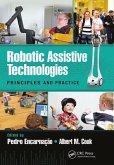Intelligent Assistive Technologies for Dementia
Clinical, Ethical, Social, and Regulatory Implications
Herausgeber: Jotterand, Fabrice; Wangmo, Tenzin; Ienca, Marcello
Intelligent Assistive Technologies for Dementia
Clinical, Ethical, Social, and Regulatory Implications
Herausgeber: Jotterand, Fabrice; Wangmo, Tenzin; Ienca, Marcello
- Gebundenes Buch
- Merkliste
- Auf die Merkliste
- Bewerten Bewerten
- Teilen
- Produkt teilen
- Produkterinnerung
- Produkterinnerung
The increasingly widespread implementation and use of intelligent assistive technologies (IATs) is reshaping dementia care. This volume provides an up-to-date overview of the current state of IATs for dementia care. The new essays collected here examine what IATs will mean for clinical practice and the ethical and regulatory challenges they will pose.
Andere Kunden interessierten sich auch für
![Hilfsmittel, Assistive Technologien und Robotik Hilfsmittel, Assistive Technologien und Robotik]() Barbara KleinHilfsmittel, Assistive Technologien und Robotik20,00 €
Barbara KleinHilfsmittel, Assistive Technologien und Robotik20,00 €![Robotic Assistive Technologies Robotic Assistive Technologies]() Robotic Assistive Technologies228,99 €
Robotic Assistive Technologies228,99 €![High Performance Computing for Intelligent Medical Systems High Performance Computing for Intelligent Medical Systems]() High Performance Computing for Intelligent Medical Systems207,99 €
High Performance Computing for Intelligent Medical Systems207,99 €![E-Health, Assistive Technologies and Applications for Assisted Living E-Health, Assistive Technologies and Applications for Assisted Living]() E-Health, Assistive Technologies and Applications for Assisted Living255,99 €
E-Health, Assistive Technologies and Applications for Assisted Living255,99 €![Intelligent Technologies for Bridging the Grey Digital Divide Intelligent Technologies for Bridging the Grey Digital Divide]() Intelligent Technologies for Bridging the Grey Digital Divide188,99 €
Intelligent Technologies for Bridging the Grey Digital Divide188,99 €![Intelligent Technologies and Parkinson's Disease Intelligent Technologies and Parkinson's Disease]() Intelligent Technologies and Parkinson's Disease399,99 €
Intelligent Technologies and Parkinson's Disease399,99 €![Intelligent Drug Prescribing in Psychiatry Intelligent Drug Prescribing in Psychiatry]() Peter TyrerIntelligent Drug Prescribing in Psychiatry142,99 €
Peter TyrerIntelligent Drug Prescribing in Psychiatry142,99 €-
-
-
The increasingly widespread implementation and use of intelligent assistive technologies (IATs) is reshaping dementia care. This volume provides an up-to-date overview of the current state of IATs for dementia care. The new essays collected here examine what IATs will mean for clinical practice and the ethical and regulatory challenges they will pose.
Hinweis: Dieser Artikel kann nur an eine deutsche Lieferadresse ausgeliefert werden.
Hinweis: Dieser Artikel kann nur an eine deutsche Lieferadresse ausgeliefert werden.
Produktdetails
- Produktdetails
- Verlag: Oxford University Press
- Seitenzahl: 320
- Erscheinungstermin: 2. Oktober 2019
- Englisch
- Abmessung: 239mm x 157mm x 28mm
- Gewicht: 590g
- ISBN-13: 9780190459802
- ISBN-10: 0190459808
- Artikelnr.: 57148063
- Herstellerkennzeichnung
- Libri GmbH
- Europaallee 1
- 36244 Bad Hersfeld
- gpsr@libri.de
- Verlag: Oxford University Press
- Seitenzahl: 320
- Erscheinungstermin: 2. Oktober 2019
- Englisch
- Abmessung: 239mm x 157mm x 28mm
- Gewicht: 590g
- ISBN-13: 9780190459802
- ISBN-10: 0190459808
- Artikelnr.: 57148063
- Herstellerkennzeichnung
- Libri GmbH
- Europaallee 1
- 36244 Bad Hersfeld
- gpsr@libri.de
Fabrice Jotterand is Associate Professor and Director of the Graduate Program in Bioethics at the Center for Bioethics and Medical Humanities, Medical College of Wisconsin and Senior Researcher at the Institute for Biomedical Ethics, University of Basel, Switzerland. Bernice Elger Bernice Elger is internist and Head of the Institute for Biomedical Ethics (University of Basel) and full professor at the Center for Legal Medicine (University of Geneva) where she leads the Unit for Health Law and Humanitarian Medicine. She studied medicine and theology in Germany, France, Switzerland and the US. Tenzin Wangmo is a Senior Researcher at the Institute for Biomedical Ethics, University of Basel, Switzerland. Her scholarship and research interests focus on issues including intergenerational relationship, aging and ethics, health of older prisoners, and empirical bioethics. Marcello Ienca is a research fellow at the Swiss Federal Institute of Technology (ETH Zurich). His research focuses on the convergence of natural and artificial intelligence in the digital age with particular emphasis on the ethical and social implications of neurotechnology, machine intelligence, big data and digital health.
* 1. Introduction
* Fabrice Jotterand, Marcello Ienca, Tenzin Wangmo and Bernice S. Elger
* PART I: CURRENT LANDSCAPE
* 2. Dementia in an Ageing World
* Thomas Fritze, Anne Fink and Gabriele Doblhammer
* 3. Dementia and Neurocognitive Disability
* Christophe J. Büla
* 4. Can Robots, Apps and Other Technologies Meet the Future Global
Demands of Dementia?
* Arlene Astell
* 5. Augmented Reality-Assisted Dementia Care
* Mengyu Y. Zhao, Soh K. Ong, and Andrew Y.C. Nee
* PART II: PSYCHO-SOCIAL IMPLICATIONS
* 6. Caring for Older Adults with Dementia: The Potential of Assisted
Technology in Reducing Caregiving Burden
* Tenzin Wangmo
* 7. The Predestined Nature of Assistive Technologies for Dementia
* Taro Sugihara, Tsutomu Fujinami and Osamu Moriyama
* 8. Shaping the Development and Use of Intelligent Assistive
Technologies in Dementia: Some Thoughts
* Elisabeth Hildt
* PART III: ETHICAL AND REGULATORY CHALLENGES
* 9. Ethical Concerns About the Use of Assistive Technologies: How to
Balance Beneficence, and Respect for Autonomy in the Care of Dementia
Patients?
* Bernice S. Elger
* 10. Issues of Informed Consent from Persons with Dementia When
Employing Assistive Technologies
* Peter Novitzky, Cynthia Chen, Alan F. Smeaton, Renaat Verbruggen and
Bert Gordijn
* 11. Personal Identity, Neuroprosthetics, and Alzheimer's Disease
* Fabrice Jotterand
* 12. Developing Assistive Technologies for Persons with Alzheimer's
Disease and Their Carers: The Ethics of Doing Good, Not Harm
* Diane Mahoney
* 13. Privacy and Security Issues in Intelligent Assistive Technologies
for Dementia: The Case of Ambient Assisted Living, Wearables and
Service Robotics
* Marcello Ienca and Eduard Fosch Villaronga
* 14. Developing Ethical Web- and Mobile-Based Technologies for
Dementia: Challenges and Opportunities
* Julie Robillard and Tanya E. Feng
* 15. Dementia and the Regulation of Gerontechnology
* James Beauregard
* 16. Epilogue: Dementia in the Digital Age
* Marcello Ienca and Tenzin Wangmo
* Fabrice Jotterand, Marcello Ienca, Tenzin Wangmo and Bernice S. Elger
* PART I: CURRENT LANDSCAPE
* 2. Dementia in an Ageing World
* Thomas Fritze, Anne Fink and Gabriele Doblhammer
* 3. Dementia and Neurocognitive Disability
* Christophe J. Büla
* 4. Can Robots, Apps and Other Technologies Meet the Future Global
Demands of Dementia?
* Arlene Astell
* 5. Augmented Reality-Assisted Dementia Care
* Mengyu Y. Zhao, Soh K. Ong, and Andrew Y.C. Nee
* PART II: PSYCHO-SOCIAL IMPLICATIONS
* 6. Caring for Older Adults with Dementia: The Potential of Assisted
Technology in Reducing Caregiving Burden
* Tenzin Wangmo
* 7. The Predestined Nature of Assistive Technologies for Dementia
* Taro Sugihara, Tsutomu Fujinami and Osamu Moriyama
* 8. Shaping the Development and Use of Intelligent Assistive
Technologies in Dementia: Some Thoughts
* Elisabeth Hildt
* PART III: ETHICAL AND REGULATORY CHALLENGES
* 9. Ethical Concerns About the Use of Assistive Technologies: How to
Balance Beneficence, and Respect for Autonomy in the Care of Dementia
Patients?
* Bernice S. Elger
* 10. Issues of Informed Consent from Persons with Dementia When
Employing Assistive Technologies
* Peter Novitzky, Cynthia Chen, Alan F. Smeaton, Renaat Verbruggen and
Bert Gordijn
* 11. Personal Identity, Neuroprosthetics, and Alzheimer's Disease
* Fabrice Jotterand
* 12. Developing Assistive Technologies for Persons with Alzheimer's
Disease and Their Carers: The Ethics of Doing Good, Not Harm
* Diane Mahoney
* 13. Privacy and Security Issues in Intelligent Assistive Technologies
for Dementia: The Case of Ambient Assisted Living, Wearables and
Service Robotics
* Marcello Ienca and Eduard Fosch Villaronga
* 14. Developing Ethical Web- and Mobile-Based Technologies for
Dementia: Challenges and Opportunities
* Julie Robillard and Tanya E. Feng
* 15. Dementia and the Regulation of Gerontechnology
* James Beauregard
* 16. Epilogue: Dementia in the Digital Age
* Marcello Ienca and Tenzin Wangmo
* 1. Introduction
* Fabrice Jotterand, Marcello Ienca, Tenzin Wangmo and Bernice S. Elger
* PART I: CURRENT LANDSCAPE
* 2. Dementia in an Ageing World
* Thomas Fritze, Anne Fink and Gabriele Doblhammer
* 3. Dementia and Neurocognitive Disability
* Christophe J. Büla
* 4. Can Robots, Apps and Other Technologies Meet the Future Global
Demands of Dementia?
* Arlene Astell
* 5. Augmented Reality-Assisted Dementia Care
* Mengyu Y. Zhao, Soh K. Ong, and Andrew Y.C. Nee
* PART II: PSYCHO-SOCIAL IMPLICATIONS
* 6. Caring for Older Adults with Dementia: The Potential of Assisted
Technology in Reducing Caregiving Burden
* Tenzin Wangmo
* 7. The Predestined Nature of Assistive Technologies for Dementia
* Taro Sugihara, Tsutomu Fujinami and Osamu Moriyama
* 8. Shaping the Development and Use of Intelligent Assistive
Technologies in Dementia: Some Thoughts
* Elisabeth Hildt
* PART III: ETHICAL AND REGULATORY CHALLENGES
* 9. Ethical Concerns About the Use of Assistive Technologies: How to
Balance Beneficence, and Respect for Autonomy in the Care of Dementia
Patients?
* Bernice S. Elger
* 10. Issues of Informed Consent from Persons with Dementia When
Employing Assistive Technologies
* Peter Novitzky, Cynthia Chen, Alan F. Smeaton, Renaat Verbruggen and
Bert Gordijn
* 11. Personal Identity, Neuroprosthetics, and Alzheimer's Disease
* Fabrice Jotterand
* 12. Developing Assistive Technologies for Persons with Alzheimer's
Disease and Their Carers: The Ethics of Doing Good, Not Harm
* Diane Mahoney
* 13. Privacy and Security Issues in Intelligent Assistive Technologies
for Dementia: The Case of Ambient Assisted Living, Wearables and
Service Robotics
* Marcello Ienca and Eduard Fosch Villaronga
* 14. Developing Ethical Web- and Mobile-Based Technologies for
Dementia: Challenges and Opportunities
* Julie Robillard and Tanya E. Feng
* 15. Dementia and the Regulation of Gerontechnology
* James Beauregard
* 16. Epilogue: Dementia in the Digital Age
* Marcello Ienca and Tenzin Wangmo
* Fabrice Jotterand, Marcello Ienca, Tenzin Wangmo and Bernice S. Elger
* PART I: CURRENT LANDSCAPE
* 2. Dementia in an Ageing World
* Thomas Fritze, Anne Fink and Gabriele Doblhammer
* 3. Dementia and Neurocognitive Disability
* Christophe J. Büla
* 4. Can Robots, Apps and Other Technologies Meet the Future Global
Demands of Dementia?
* Arlene Astell
* 5. Augmented Reality-Assisted Dementia Care
* Mengyu Y. Zhao, Soh K. Ong, and Andrew Y.C. Nee
* PART II: PSYCHO-SOCIAL IMPLICATIONS
* 6. Caring for Older Adults with Dementia: The Potential of Assisted
Technology in Reducing Caregiving Burden
* Tenzin Wangmo
* 7. The Predestined Nature of Assistive Technologies for Dementia
* Taro Sugihara, Tsutomu Fujinami and Osamu Moriyama
* 8. Shaping the Development and Use of Intelligent Assistive
Technologies in Dementia: Some Thoughts
* Elisabeth Hildt
* PART III: ETHICAL AND REGULATORY CHALLENGES
* 9. Ethical Concerns About the Use of Assistive Technologies: How to
Balance Beneficence, and Respect for Autonomy in the Care of Dementia
Patients?
* Bernice S. Elger
* 10. Issues of Informed Consent from Persons with Dementia When
Employing Assistive Technologies
* Peter Novitzky, Cynthia Chen, Alan F. Smeaton, Renaat Verbruggen and
Bert Gordijn
* 11. Personal Identity, Neuroprosthetics, and Alzheimer's Disease
* Fabrice Jotterand
* 12. Developing Assistive Technologies for Persons with Alzheimer's
Disease and Their Carers: The Ethics of Doing Good, Not Harm
* Diane Mahoney
* 13. Privacy and Security Issues in Intelligent Assistive Technologies
for Dementia: The Case of Ambient Assisted Living, Wearables and
Service Robotics
* Marcello Ienca and Eduard Fosch Villaronga
* 14. Developing Ethical Web- and Mobile-Based Technologies for
Dementia: Challenges and Opportunities
* Julie Robillard and Tanya E. Feng
* 15. Dementia and the Regulation of Gerontechnology
* James Beauregard
* 16. Epilogue: Dementia in the Digital Age
* Marcello Ienca and Tenzin Wangmo








